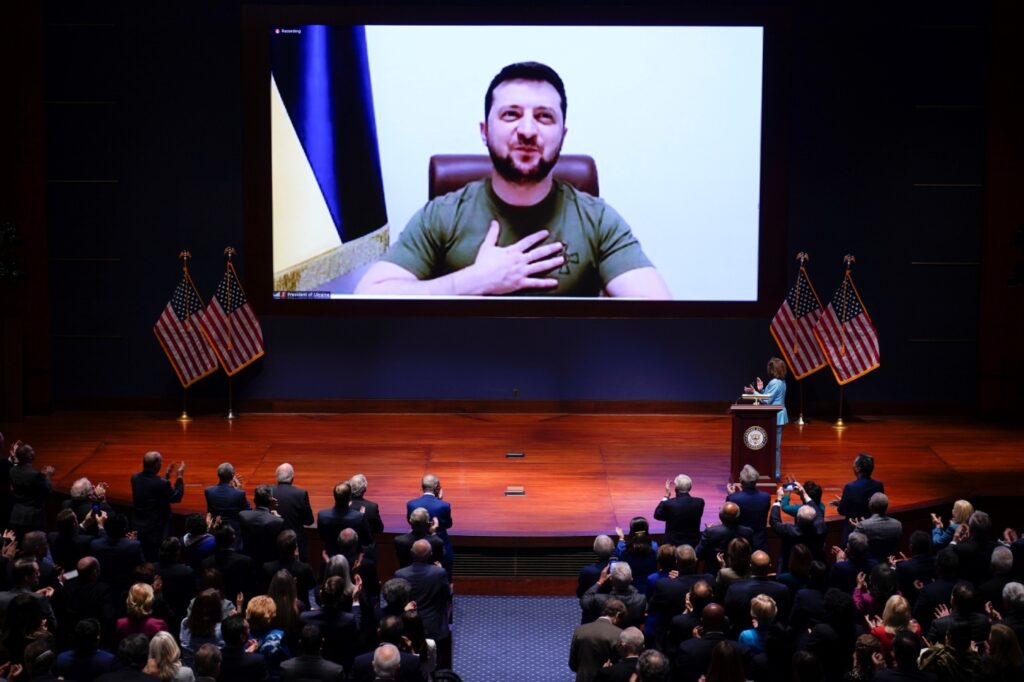
As Vladimir Putin’s war against Ukraine entered its fourth week, Ukrainian President Volodymyr Zelensky addressed the United States Congress on Wednesday.
President Zelensky expressed gratitude for America’s generosity, while also calling on the U.S. to “do more” to aid his country. He underscored the global significance of the conflict, and indicated that a Ukrainian victory will only be possible with the continuous support of the U.S.
“The destiny of our country is being decided,” Zelensky said, framing Ukraine’s plight as a broader global struggle for democracy, independence and freedom.
To be sure, one cannot overstate the importance and consequentiality of this war. Ukraine’s future is on the line, the international order that has existed since World War II is on the line, and the endurance of global democracy is on the line.
Furthermore, the sole aggressor in this war, Vladimir Putin, is a rogue, unhinged, and ruthless dictator – or, to use President Biden’s characterization, a “war criminal.” Putin also knows that he cannot afford to lose, and will keep fighting no matter the human, economic, military, or political cost.
Put another way, the stakes couldn’t be higher. The U.S. and NATO must continue doing everything possible, short of putting boots on the ground, to support Ukraine, while also squeezing and isolating Russia economically.
Indeed, anything less than a forceful Western response at every stage of this conflict will give Putin reassurance to continue waging this inhumane war – potentially on an even more damaging scale – and in the long term, could embolden Putin to destabilize and lay claim to other weaker independent countries.
In many ways, President Biden’s handling of the crisis thus far has been commendable. He has rallied Europe around a unified response to Putin’s aggression, banned imports of Russian oil, and imposed crushing sanctions that have cut Russia off from the global financial market.
The administration has also provided billions of dollars in military and humanitarian aid to Ukraine. And after Zelensky spoke on Wednesday, President Biden announced that the U.S. would step up its military shipments to Ukraine, bringing the total amount of authorized military aid in just the past week to $1 billion.
That being said, more can be done by both the U.S. and Europe to support Ukraine and tighten the noose on Russia, given the extraordinarily high stakes of this war.
NATO must seriously consider imposing a no-fly-zone over Ukraine, and the Biden Administration should begin working with Europe to sanction Russia’s energy sector – despite the risks both actions carry in their own ways for the U.S. and Europe.
And under the worst-case scenario, if Kyiv falls – at which point Moscow would work to install a puppet regime – the U.S. must also be prepared to provide unwavering support to Ukraine until the nation secures its sovereignty, whether it takes weeks, months, or years.
Even more critically, the White House cannot continue indirectly sabotaging American interests by re-negotiating the Iran Nuclear Deal, which is essentially a lifeline to Russia. The reinstated deal gives Putin the opportunity to leverage Iran for relief from sanctions imposed by the West, in exchange for Russia helping Iran do the same.
By re-entering the deal now – at a time when the West needs to isolate Russia and debilitate their economy – the Biden Administration would essentially be allowing Russia and Iran to work together against America’s interests, as Russia has played a role as an intermediary in negotiations.
Related Articles
Todd Spitzer’s hypocritical smearing of Pete Hardin
Republicans act on homelessness where Democrats have failed
California Gov. Newsom’s firewall: Republican-hating voters
Campus free-speech problems come down to culture
Menthol ban a bad, harmful idea
At the same time, the White House must end talks with Russian-backed countries that the U.S. has sanctioned for human-rights abuses – namely, Venezuela – even if doing so could help ease oil costs at home following the ban of Russian oil.
Make no mistake, Iran and Venezuela are our adversaries. While striking these deals may seem like the right move in a time of crisis, doing so will only undercut Western interests, damage Ukraine, and prop up Russia.
On Wednesday, Zelensky closed his speech to Congress with a message to President Biden: “You are the leader of your great nation. I wish you to be the leader of the world. Being the leader of the world means to be the leader of peace.”
In order for the United States to once again truly become the world leader, President Biden must become “the leader of peace,” – and do what is absolutely necessary to defend freedom and democratic values, in Ukraine and elsewhere, at all costs.
Douglas Schoen is a political consultant.
